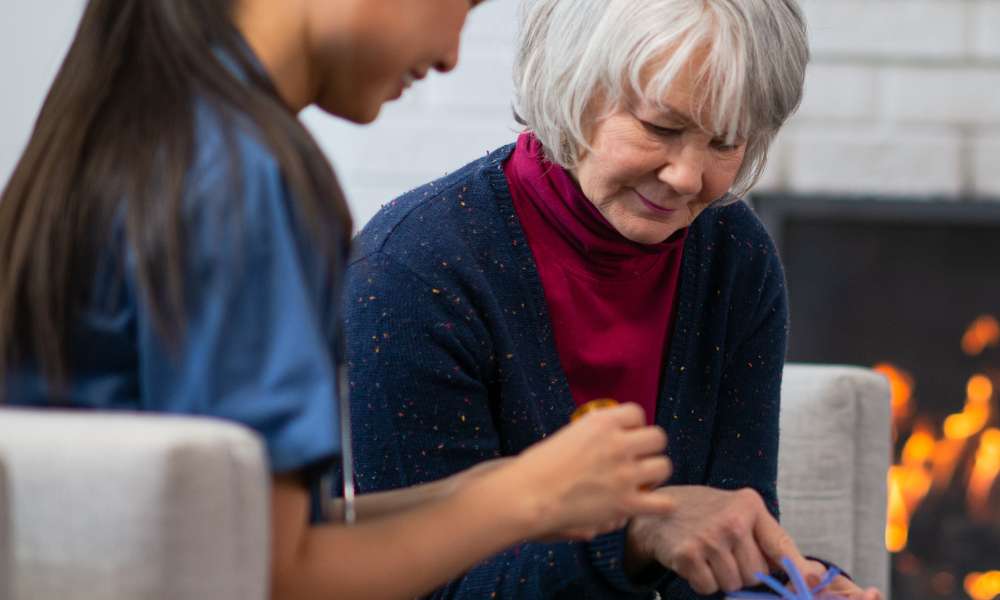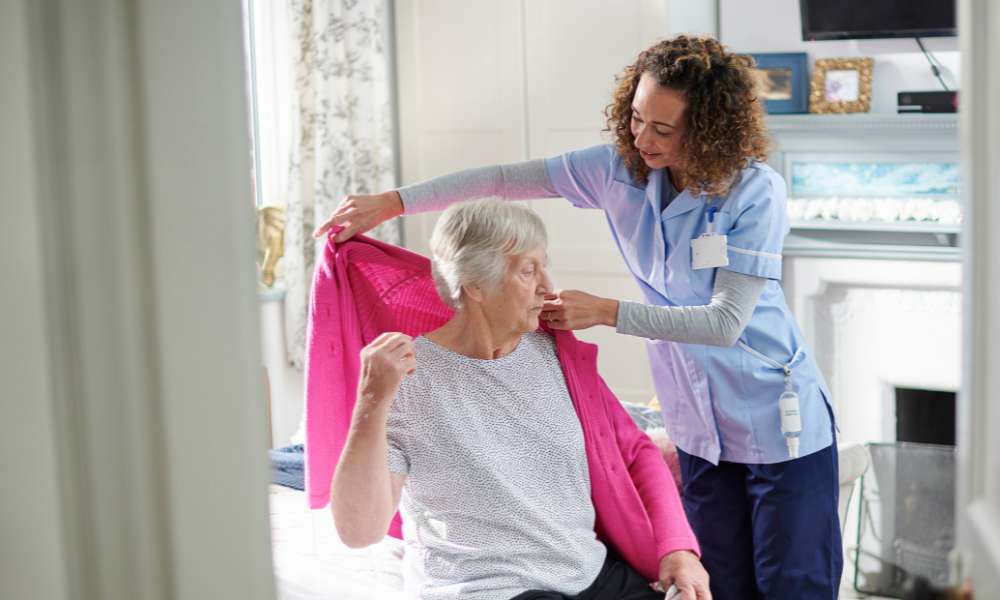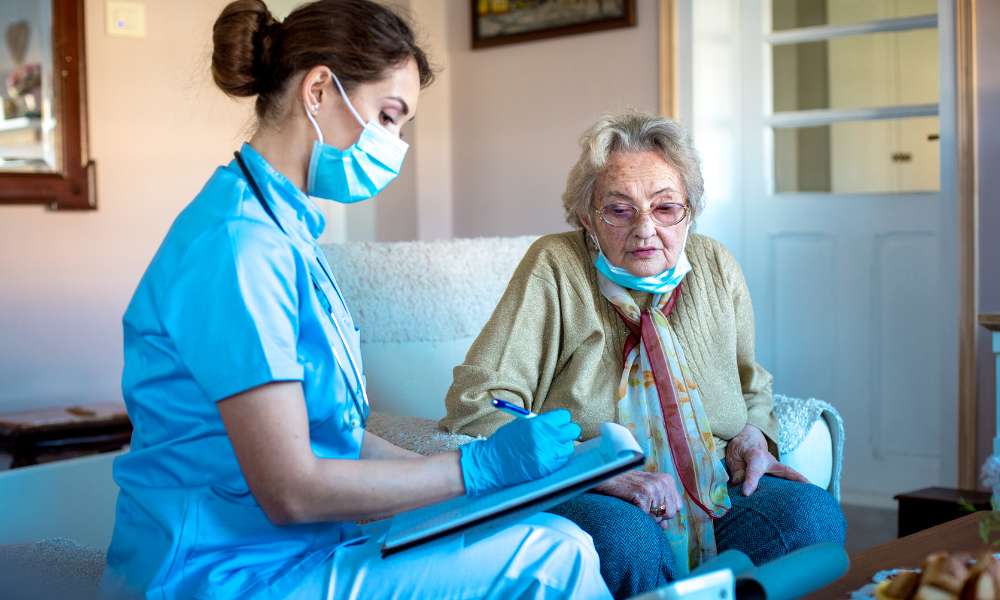
In the voyage of aging, the significance of caregivers for seniors, particularly those associated with I&Y Seniorcare Homecare, cannot be emphasized enough. These devoted individuals play a pivotal role in guaranteeing the welfare, ease, and dignity of elderly individuals. This article explores the diverse facets of caregiving, shedding light on the indispensable role these caregivers, especially those affiliated with I&Y Seniorcare Homecare, play in our society.
The Essence of Senior Caregiving
At its core, caregiving for seniors involves more than just attending to their physical needs. It’s about providing holistic support that encompasses emotional, social, and sometimes financial assistance. As people age, they may face various health challenges, mobility issues, or cognitive impairments. Caregivers step in to bridge the gap between the seniors’ capabilities and their daily needs, ensuring a quality of life that every individual deserves.
Types of Caregivers
Caregivers come in different forms – from family members who naturally assume the role to professional caregivers who are trained to handle specific needs of the elderly. Professional caregivers often work in settings like assisted living facilities, nursing homes, or provide in-home care services. They are equipped with the skills to handle medical needs, emergency situations, and provide companionship.
Challenges Faced by Caregivers
Caregiving, while rewarding, comes with its set of challenges. It demands physical stamina, emotional resilience, and often involves managing complex medical tasks. Caregivers must also navigate the delicate balance of empowering their charges while ensuring their safety and well-being. For family caregivers, this role can add an extra layer of emotional complexity as they watch their loved ones age.
Training and Support for Caregivers
Recognizing the demanding nature of this role, it’s essential that caregivers receive proper training and support. This includes learning about the aging process, understanding common health issues in seniors, and being trained in first aid and emergency response. Equally important is the provision of emotional and mental health support for caregivers, as the role can be emotionally taxing.
The Impact of Caregiving on Seniors’ Lives
The presence of a dedicated caregiver can significantly enhance the quality of life for seniors. It allows them to maintain a level of independence, feel safe and cared for, and enjoy social interaction. For many seniors, their caregivers become their confidants and a crucial part of their daily lives.
The Changing Landscape of Senior Caregiving
As our population ages, the demand for skilled caregivers is rising. Technological advancements are also shaping the way caregiving is delivered. From telehealth services to assistive technologies, these developments are making it easier for seniors to receive care and for caregivers to provide it effectively.
Recognizing and Appreciating Caregivers
It’s important for society to acknowledge and appreciate the vital role that caregivers play. This can be through better policies, adequate compensation, and creating a supportive community that recognizes the value of their work.
Conclusion
Caregivers for seniors are the unsung heroes in our communities. They provide more than just care; they offer companionship, dignity, and a sense of security to our elderly population. As we move forward, it is crucial to ensure that these caregivers are supported, trained, and appreciated for the invaluable role they play in our society.
iandyseniorcarewordpresslogin



















На данной платформе вы найдете клинику ментального здоровья, которая предлагает поддержку для людей, страдающих от тревоги и других психологических расстройств. Эта комплексное лечение для восстановления ментального здоровья. Врачи нашего центра готовы помочь вам справиться с проблемы и вернуться к гармонии. Опыт наших психологов подтверждена множеством положительных рекомендаций. Обратитесь с нами уже сегодня, чтобы начать путь к лучшей жизни. http://janetweiner.com/__media__/js/netsoltrademark.php?d=empathycenter.ru%2Fpreparations%2Fl%2Flamotridzhin%2F
At this page, you can browse different CS:GO gaming sites. We list a wide range of gambling platforms dedicated to CS:GO players. These betting options is handpicked to ensure trustworthiness. cs 2 betting Whether you're new to betting, you'll conveniently select a platform that fits your style. Our goal is to make it easy for you to access reliable CS:GO gambling websites. Dive into our list now and enhance your CS:GO playing experience!
This website offers you the chance to find workers for short-term hazardous missions. Users can quickly set up help for specialized operations. All listed individuals are qualified in executing critical operations. hitman-assassin-killer.com This site provides safe communication between clients and workers. When you need fast support, the site is here for you. List your task and get matched with the right person now!
Thus, females can take benefit of a simultaneous muscle-building and fat-burning impact. Anavar dramatically will increase protein synthesis, nitrogen retention, and IGF-1 (insulin-like development factor) levels, inflicting important enhancements in muscle hypertrophy (size) and power. Clen has a potent impact on the metabolism due to stimulation of the central nervous system, shifting the body into a state of thermogenesis. This is when the body’s temperature rises, consequently inflicting the body to cool itself down by way of elevated sweating. Laboratory check results (available from the 12 months 2000 onwards) were categorized into 5 phases, primarily based on the anamnestic timeline of doping use. In response to those criticisms, many feminine bodybuilders have spoken out about the constructive impression that the sport has had on their lives and self-confidence. They argue that bodybuilding allows them to push themselves to their physical limits, and provides a way of group and empowerment that is hard to search out. One of the plausible hypotheses could possibly be related to anabolic steroid‐induced hypogonadism (ASIH), a just lately described entity. Yes, anabolic hard steroids will have an effect on hormone ranges and end in missed intervals or irregular menstruation. All these steroids have very strong androgenic results and can lead to deepening voice, hirsutism, etc., in a permanent manner. Substances inside these alternate options lower irritation, restore glycogen levels, and assist repair muscular tissues. This leads to lowered restoration time between training, enabling extra intense and frequent training sessions without overtraining. Steroids make all of those easier and extra intense, in order that they have no purpose to check or be strict with drug use. The whole ‘sport’ of bodybuilding (outside of natural bodybuilding) relies on underground steroid use. Formally, the Mr. Olympia bodybuilding competitors does not allow steroids but has a no-testing policy in order that bodybuilders can compete whereas utilizing steroids. This is an unstated cultural agreement for the competitors and all the competitors perceive – and are using steroids themselves. This is as close as you’re going to get to a pure steroid, with a extra mild method, no well being risks, and a broad range of healthy nutrients to help efficiency and hormonal perform. Pure bodybuilding aims to offer an all-natural alternative where individuals who don’t want to take steroids aren't at an unfair drawback. Nonetheless, many female opponents are inclined to take these without actually understanding how they work, nor being conscious of the potential unwanted effects they can trigger. It should be famous that this text is written for instructional purposes solely and shouldn't be taken as advice in anyway. Thus, commonly used compounds like Testosterone, Dianabol, and Trenbolone are not recommended for feminine use. While these steroids could not cause long-term bodily health points for women, the danger of virilization and its potential impression on psychological well-being in the lengthy term makes them unfavorable decisions. To conclude, the outcomes of a four-week Winstrol solo cycle may be vital, with potential for improved aesthetics and efficiency. The degree of these results, nevertheless, significantly depends on particular person commitment to acceptable dosage, a balanced diet, and a constant train routine. Commencing with a decrease dosage is a method that may assist mitigate the risk of adverse effects. It is essential to attentively heed one’s body and be vigilant for any signs of intolerance or undesired reactions through the Winstrol routine. In the occasion of troublesome adverse outcomes, it might be necessary to reassess the dosage or even ponder discontinuing using Winstrol altogether. Lifeworld interviews were carried out with 12 girls, aged 21–56 years, about their experiences of using anabolic steroids. The outcomes show that women expertise a way of pride when they successfully achieve their goals. This is the driving drive, triggering rigidity between struggling and success. This testosterone-to-estrogen balance seems necessary for avoiding a masculine look. However, research and our experience counsel that Anadrol doesn't produce the same androgenic results in ladies. It is favorable among ladies because of its low androgenic ranking (44-57), thus inflicting a low danger of virilization. Whether using oral or injectable Winstrol, the outcomes by the tip of the cycle are virtually similar, as it’s the identical compound. The informants had described their experiences within the interviews, which implies that they had delivered information to be analyzed. A rich materials in meanings and variations of these meanings is critical to find a way to reach the important description of the phenomenon. In the analysis process, nonetheless, we concentrate on the phenomenon, which signifies that the evaluation just isn't subject-orientated, but phenomenon-orientated. In other words, we seek for meanings in the experiences collected, that represent the phenomenon. The essence presents the meanings of the phenomenon on an summary and common stage. Thus, the whole results of the research describes the phenomenon in a general sense, which isn't solely associated to the informants within the examine. In order to seek out the essential which means of the phenomenon, the evaluation work have to be carried out with a reflective and bridling perspective according to the RLR strategy (Dahlberg et al., 2008). Strength and physical efficiency can additionally be notably improved; with out having to –theoretically- fear about experiencing critical unwanted side effects. Primobolan offers ladies the distinctive capacity to add the right quantity of muscle to their body – whereas changing into leaner and preserving their femininity. Primobolan is a particularly engaging steroid for girls as a outcome of it can be used for each bulking and chopping purposes. Some girls won't get to experience any Primobolan unwanted facet effects, whereas others could possibly endure from all of them. According to Brinkmann and Kvale (2014), the info should be divided, organized, and simplified to get a transparent picture. The analysis began with listening and studying the interviews of their entirety with an open mind to facilitate an preliminary understanding. After repeated reading, the transcript was divided into which means items to search for meanings. From a phenomenological perspective and validity analysis should be meaning-oriented (van Wijngaarden et al., 2017). When the interviews had been emptied of all which means, the meanings have been clustered together to find similarities and differences. A sample of meanings slowly emerged and shaped a meaningful structure that constitutes the essence of the phenomenon. The purpose is then to describe the variations and nuances of the phenomenon, which implies the constituents. • Bodily Bodily Modifications – When males take too much estrogen, they'll develop breast tissue and develop man boobs. When girls take too much testosterone or too much of the anabolic hormones, they risk changes to their our bodies too. For women, the danger is rising a larger clitoris • Elevated Physique Weight – Count On that your physique is not going to only wish to develop muscular tissues but retailer fats too. References: non aromatizing steroids; jbhnews.com,
The manufacturer offers free worldwide transport and 24/7 customer help, making D-Bal a reliable and safe choice for anybody looking to gain muscle mass and improve their exercise routine. Pure bodybuilders wanting to function inside the confines of the legislation could take testosterone boosters. A Quantity Of popular ingredients include d-aspartic acid, tribulus terrestris, and ZMA. Nevertheless, the outcomes confirmed no notable improvements in any of the teams when recording serum testosterone levels, one rep max, or fat-free mass. The solely path for most of us seeking to buy Anavar is from an underground lab. Sometimes, they even embrace cheaper compounds, like Winstrol or Dianabol, or even components that aren’t even steroids. Females can see a more noticeable achieve in muscle when utilizing Anavar. They won’t be turning into the Hulk (nor would most ladies want to), however the increased definition is a certainty, and with muscle replacing fats weight, any physique weight placed on might be lean muscle. Males on a cutting cycle with Anavar can anticipate an outstanding fat loss, and will most likely be quite quick because Anavar is a quick-acting steroid that you’ll solely use for eight weeks max. These long-term unwanted side effects are much extra likely to come about from another extra highly effective steroids you could be stacking Anavar with somewhat than from Anavar itself. Pimples comes about due to elevated activity of the oil-producing sebaceous glands thanks to the androgen results of some steroids. One examine discovered that over 40% of steroid users experienced zits, particularly on the face and again. The excellent news is that acne can disappear when you stop the steroid; nonetheless, baldness is more everlasting. This has significant advantages but additionally offers you some sense of invincibility, however once more, most users are nonetheless best suggested to stay with commonplace rep ranges for damage avoidance. Some steroids, like Deca, are distinctive at serving to heal damage and constructing cartilage, however no compound will make you indestructible or immune to new accidents. This could presumably be the best stack ever for slicing – it actually was for me! All three compounds combine to ship a hard and ripped physique, and so they can do that at pretty unfastened doses thanks to the incredible means all of them work collectively. Turkesterone and ecdysterone are among the many finest dietary supplements for those wanting to stay pure. Moreover, HGH can cause a protruding impact on the stomach, also identified as HGH gut, as a end result of a rise in visceral fat, causing a bloated look to the midsection. Further research is required for ecdysterone to be considered as a supplement with anabolic results. There is extra analysis carried out on ecdysterone, enabling a larger understanding of its potential anabolic properties (compared to turkesterone). Bodybuilders typically buy SARMs online or from individuals they know. If you meet the health requirement and you have the power to steroid responsibly, there are certain anabolics that carry a higher level of safety than others. Of course, we do not need simply security we additionally need steroids that work; if a steroid is completely protected yet does absolutely nothing it is just a waste of time. For the healthy grownup male, when it comes to secure steroids the most secure of all will at all times be testosterone. Testosterone is amongst the most well-tolerated hormones in healthy grownup males; your body is not unfamiliar with it, and has produced it your whole life. Additional, it is doubtless certainly one of the best anabolics of all, as it'll provide almost every trait any Anabolic steroid customers might ever be after. This dosage helps with muscle growth and fats loss whereas minimizing side effects. With deca, your muscle tissue shall be fuller and thicker than ever before. Having big muscles is one factor, having incredibly thick and full muscular tissues which makes you look photoshopped is one other. There are a quantity of different components that can assist enhancing your total health and can absolutely help in your fitness endeavors. Perhaps one of the extra fascinating elements in TESTO-MAX can be the addition of Boron, which has been shown to extend free Testosterone by reducing SHBG. We extensively reviewed revealed research, medical trials, and scientific literature to determine the effectiveness of each ingredient in legal steroids. We solely advocate supplements with strong scientific evidence supporting their effectiveness. Creatine, protein, and amino acids can have a positive effect on physique composition, but the results are incomparable to anabolic steroids. There could also be a quantity of hyper-responders to sure testosterone boosters, inflicting them to realize 10 lbs of lean mass from approximately 4–8 weeks of supplementation. Nevertheless, this is not typical, and for most customers, a fraction of that is likely to be the outcome. Unfortunately, in practice, SARMs can produce harsh unwanted effects that won't solely equal anabolic steroids but in addition surpass their toxicity level. The majority of steroids have a direct affect on the bodily production of DHT and are commonly used for enhancing muscle mass. The key takeaway is that even the most secure steroids must be approached with warning, proper information, and ideally, medical supervision to minimize potential well being points. Steroid cycles are sometimes categorized based on person experience levels. Newbies typically begin with a single compound, normally testosterone, for a brief duration of 8-12 weeks. Having been within the muscle building and energy business for greater than three a long time, I even have experience in the anabolic steroid recreation from each angle. While Primobolan (Methenolone) and Anavar (Oxandrolone) are often discussed in athletic and bodybuilding circles, their use is extremely regulated in most international locations. Both compounds are categorised as anabolic-androgenic steroids (AAS) and are controlled substances, meaning possession or distribution and not using a legitimate prescription is often unlawful. Different men might be able to channel the heightened aggression and vitality into exercises, but this can be a serious aspect impact that must be considered. If you’re going to run a Halotestin cycle, check out my full Halotestin (Fluoxymesterone) cycle information. Mesterolone, underneath the brand name Proviron, is a useful cutting steroid for these who know how to take benefit of this distinctive compound. Whereas it can be used for mass positive aspects, this steroid is principally used in chopping cycles. Proviron is derived from dihydrotestosterone (DHT) and is used as an oral steroid. This is an anabolic steroid used within the livestock industry to increase muscle progress in cattle. Only some esters of Tren are available, with Trenbolone itself not obtainable. References: How To Take Steroids; Jbhnews.Com,
Looking to connect with qualified workers willing for short-term hazardous jobs. Need a specialist for a high-risk task? Connect with trusted individuals here for critical risky operations. hire an assassin Our platform links clients to trained professionals willing to take on high-stakes temporary gigs. Hire background-checked laborers to perform dangerous duties safely. Perfect for urgent situations requiring specialized labor.
This website contains necessary info about how to become a security expert. Facts are conveyed in a clear and concise manner. It helps master a range of skills for entering systems. What's more, there are practical examples that illustrate how to utilize these capabilities. how to become a hacker All information is periodically modified to stay current with the latest trends in hacking techniques. Extra care is concentrated on practical application of the gained expertise. Remember that each maneuver should be utilized ethically and according to proper guidelines only.
On this site is available exclusive promocodes for 1x betting. These special offers allow to earn extra advantages when participating on the platform. Every listed bonus options are always up-to-date to confirm their effectiveness. With these codes one can boost your chances on 1xBet. https://traveldealworld.net/wp-content/pgs/?neobychnye_cherepahi.html Moreover, complete guidelines on how to implement discounts are provided for ease of use. Consider that some promocodes may have time limits, so verify details before applying.
Hello to our platform, where you can access premium content created exclusively for grown-ups. The entire collection available here is suitable for individuals who are of legal age. Please confirm that you are eligible before proceeding. mature video Experience a special selection of restricted content, and dive in today!
Our platform offers a large selection of pharmaceuticals for home delivery. Anyone can easily get treatments with just a few clicks. Our catalog includes everyday treatments and targeted therapies. The full range is supplied through verified pharmacies. does cialis lower blood pressure Our focus is on customer safety, with private checkout and prompt delivery. Whether you're looking for daily supplements, you'll find safe products here. Start your order today and experience reliable support.
This website contains necessary info about steps to becoming a security expert. The materials are presented in a simple and understandable manner. It helps master diverse strategies for penetrating networks. Moreover, there are hands-on demonstrations that display how to apply these competencies. how to become a hacker Full details is constantly revised to keep up with the current breakthroughs in network protection. Unique consideration is concentrated on operational employment of the learned skills. Consider that all operations should be applied lawfully and for educational purposes only.
One X Bet is a leading sports betting service. Featuring an extensive selection of events, 1XBet caters to countless users around the world. This 1XBet application crafted for both Android devices as well as iPhone bettors. http://www.kpilib.ru/forum.php?tema=11442 You can get the 1xBet app from their site or Google Play Store on Android devices. For iOS users, the application can be installed via the App Store easily.
This online service provides a large selection of pharmaceuticals for easy access. Anyone can quickly buy essential medicines from anywhere. Our catalog includes everyday drugs and targeted therapies. The full range is supplied through verified providers. priligy dosage We prioritize discreet service, with secure payments and prompt delivery. Whether you're filling a prescription, you'll find trusted options here. Begin shopping today and enjoy convenient access to medicine.
Здесь представлены свежие бонусы Melbet-промо. Воспользуйтесь ими зарегистрировавшись на сайте и получите полный бонус за первое пополнение. Кроме того, доступны коды по активным предложениям и постоянных игроков. мелбет промокод Проверяйте регулярно на странице бонусов, и будьте в курсе особые условия от Melbet. Все промокоды тестируется на валидность, поэтому вы можете быть уверены во время активации.
Здесь представлены видеообщение в реальном времени. Вам нужны непринужденные разговоры переговоры, вы найдете решения для каждого. Этот инструмент предназначена чтобы объединить пользователей глобально. пары бонгакамс Благодаря HD-качеству плюс отличному аудио, любое общение становится увлекательным. Подключиться в общий чат общаться один на один, опираясь на того, что вам нужно. Все, что требуется — стабильное интернет-соединение и любое поддерживаемое устройство, и вы сможете подключиться.
Here, you can discover a wide selection of online slots from leading developers. Players can experience retro-style games as well as new-generation slots with vivid animation and interactive gameplay. Even if you're new or an experienced player, there’s something for everyone. sweet bonanza The games are ready to play 24/7 and compatible with desktop computers and smartphones alike. All games run in your browser, so you can start playing instantly. Platform layout is intuitive, making it simple to explore new games. Sign up today, and discover the thrill of casino games!
Within this platform, explore an extensive selection virtual gambling platforms. Interested in traditional options or modern slots, you’ll find an option to suit all preferences. Every casino included fully reviewed for trustworthiness, allowing users to gamble securely. vavada Moreover, the platform unique promotions and deals for new players including long-term users. Thanks to user-friendly browsing, finding your favorite casino takes just moments, enhancing your experience. Keep informed about the latest additions through regular check-ins, because updated platforms are added regularly.
Here, you can find lots of slot machines from leading developers. Visitors can try out classic slots as well as feature-packed games with vivid animation and exciting features. Even if you're new or an experienced player, there’s something for everyone. casino slots Each title are instantly accessible 24/7 and compatible with PCs and tablets alike. You don’t need to install anything, so you can jump into the action right away. Site navigation is intuitive, making it simple to find your favorite slot. Sign up today, and dive into the world of online slots!
The Aviator Game merges exploration with high stakes. Jump into the cockpit and try your luck through turbulent skies for massive payouts. With its classic-inspired visuals, the game evokes the spirit of aircraft legends. https://www.linkedin.com/posts/robin-kh-150138202_aviator-game-download-activity-7295792143506321408-81HD/ Watch as the plane takes off – cash out before it vanishes to secure your earnings. Featuring seamless gameplay and realistic audio design, it’s a top choice for slot enthusiasts. Whether you're testing luck, Aviator delivers uninterrupted thrills with every spin.
本站 提供 多样的 成人资源,满足 各类人群 的 需求。 无论您喜欢 哪一类 的 影片,这里都 种类齐全。 所有 资源 都经过 专业整理,确保 高质量 的 观看体验。 性别 我们支持 多种设备 访问,包括 电脑,随时随地 畅享内容。 加入我们,探索 绝妙体验 的 私密乐趣。
70918248 References: none
70918248 References: steroids for losing weight (lt.dananxun.cn)
На нашей платформе интимные фото и ролики. Контент подходит тем, кто старше 18. У нас собраны широкий выбор контента. Платформа предлагает лучшие материалы в сети. Левофенацилморфан Вход разрешен после подтверждения возраста. Наслаждайтесь удобным интерфейсом.
Здесь доступны учебные пособия для учеников. Предоставляем материалы по всем основным предметам с учетом современных требований. Подготовьтесь к экзаменам с использованием пробных вариантов. http://pedagogic.ru/news/item/f00/s11/n0001171/index.shtml Демонстрационные варианты объяснят сложные моменты. Доступ свободный для удобства обучения. Применяйте на уроках и успешно сдавайте экзамены.
Трендовые фасоны сезона нынешнего года задают новые стандарты. Актуальны кружевные рукава и корсеты из полупрозрачных тканей. Металлические оттенки делают платье запоминающимся. Асимметричные силуэты определяют современные тренды. Разрезы на юбках создают баланс между строгостью и игрой. Ищите вдохновение в новых коллекциях — стиль и качество превратят вас в звезду вечера! http://xn--12cg0dgd0cgkso9a9eg1b0dvhwf.com/index.php?topic=60677.new#new
Трендовые фасоны сезона нынешнего года вдохновляют дизайнеров. В тренде стразы и пайетки из полупрозрачных тканей. Блестящие ткани создают эффект жидкого металла. Асимметричные силуэты определяют современные тренды. Минималистичные силуэты создают баланс между строгостью и игрой. Ищите вдохновение в новых коллекциях — детали и фактуры превратят вас в звезду вечера! https://storjduco2.ddns.net/forums/viewtopic.php?t=97991
Трендовые фасоны сезона 2025 года задают новые стандарты. Актуальны кружевные рукава и корсеты из полупрозрачных тканей. Блестящие ткани делают платье запоминающимся. Асимметричные силуэты определяют современные тренды. Минималистичные силуэты придают пикантности образу. Ищите вдохновение в новых коллекциях — детали и фактуры оставят в памяти гостей! https://microsecondsconsulting.com/showthread.php?tid=565
Свадебные и вечерние платья 2025 года вдохновляют дизайнеров. Актуальны кружевные рукава и корсеты из полупрозрачных тканей. Блестящие ткани придают образу роскоши. Греческий стиль с драпировкой становятся хитами сезона. Особый акцент на открытые плечи создают баланс между строгостью и игрой. Ищите вдохновение в новых коллекциях — стиль и качество сделают ваш образ идеальным! http://psychotekst.pl/Forum/viewtopic.php?f=6&t=24110
The Piguet Royal Oak 15300ST combines meticulous craftsmanship and sophisticated aesthetics. Its 39-millimeter stainless steel case guarantees a contemporary fit, achieving harmony between prominence and comfort. The distinctive geometric bezel, secured by hexagonal fasteners, epitomizes the brand’s revolutionary approach to luxury sports watches. AP 15300 st Featuring a white gold baton hour-marker dial, this model integrates a 60-hour power reserve via the automatic caliber. The intricate guilloché motif adds dimension and uniqueness, while the streamlined construction ensures discreet luxury.
Audemars Piguet’s Royal Oak 15450ST boasts a slim 9.8mm profile and 5 ATM water resistance, blending sporty durability Its silvery-grey Grande Tapisserie dial includes applied 18k white gold markers and a scratch-resistant sapphire crystal, ensuring legibility and resilience. The selfwinding mechanism ensures seamless functionality, a hallmark of Audemars Piguet’s engineering. This model was produced in 2019, reflecting subtle updates to the Royal Oak’s heritage styling. The vintage-inspired 2019 edition highlights meticulous craftsmanship, appealing to collectors. AP 15450 st A structured black dial with Tapisserie texture highlighted by luminous appliqués for clear visibility. Its matching steel bracelet combines elegance with resilience, finished with an AP folding clasp. Renowned for its iconic design, the 15400ST stands as a pinnacle for those seeking understated prestige.
На данном сайте вы найдете мессенджер-бот "Глаз Бога", позволяющий собрать всю информацию о человеке через открытые базы. Бот активно ищет по фото, используя актуальные базы в сети. Через бота можно получить пять пробивов и детальный анализ по имени. Инструмент актуален согласно последним данным и включает фото и видео. Сервис сможет узнать данные в соцсетях и предоставит информацию мгновенно. Глаз Бога glazboga.net Данный бот — идеальное решение в анализе граждан онлайн.
На данном сайте вы можете отыскать боту "Глаз Бога" , который может получить всю информацию о любом человеке из общедоступных баз . Данный сервис осуществляет поиск по номеру телефона и показывает информацию из государственных реестров . С его помощью можно проверить личность через Telegram-бот , используя фотографию в качестве ключевого параметра. пробив онлайн Алгоритм "Глаз Бога" автоматически анализирует информацию из проверенных ресурсов, формируя структурированные данные . Пользователи бота получают ограниченное тестирование для проверки эффективности. Платформа постоянно обновляется , сохраняя высокую точность в соответствии с стандартами безопасности .
Сертификация и лицензии — обязательное условие ведения бизнеса в России, гарантирующий защиту от непрофессионалов. Декларирование продукции требуется для подтверждения соответствия стандартам. Для 49 видов деятельности необходимо получение лицензий. https://ok.ru/group/70000034956977/topic/158835206633649 Игнорирование требований ведут к штрафам до 1 млн рублей. Дополнительные лицензии помогает усилить конкурентоспособность бизнеса. Соблюдение норм — залог успешного развития компании.
В этом ресурсе вы можете отыскать боту "Глаз Бога" , который может проанализировать всю информацию о любом человеке из общедоступных баз . Данный сервис осуществляет поиск по номеру телефона и показывает информацию из соцсетей . С его помощью можно узнать контакты через официальный сервис , используя автомобильный номер в качестве ключевого параметра. пробить телефон Система "Глаз Бога" автоматически обрабатывает информацию из множества источников , формируя структурированные данные . Подписчики бота получают пробный доступ для тестирования возможностей . Решение постоянно развивается, сохраняя актуальность данных в соответствии с стандартами безопасности .
На данном сайте доступен Telegram-бот "Глаз Бога", позволяющий проверить сведения по человеку через открытые базы. Бот функционирует по ФИО, используя публичные материалы онлайн. Благодаря ему доступны пять пробивов и полный отчет по имени. Инструмент проверен на август 2024 и охватывает аудио-материалы. Сервис гарантирует проверить личность в соцсетях и предоставит результаты мгновенно. https://glazboga.net/ Такой инструмент — помощник для проверки персон удаленно.
awesome
Прямо здесь можно получить сервис "Глаз Бога", что найти данные по человеку через открытые базы. Сервис функционирует по фото, анализируя публичные материалы в Рунете. Через бота осуществляется бесплатный поиск и детальный анализ по имени. Сервис актуален согласно последним данным и охватывает аудио-материалы. Сервис поможет найти профили в открытых базах и покажет информацию в режиме реального времени. https://glazboga.net/ Такой сервис — выбор для проверки граждан онлайн.
Searching for exclusive 1xBet coupon codes ? Our website is your ultimate destination to unlock valuable deals for betting . If you’re just starting or an experienced player, our curated selection provides exclusive advantages during registration . Stay updated on daily deals to multiply your betting experience . https://ztndz.com/story23827172/1xbet-promo-code-welcome-bonus-up-to-130 All listed codes are regularly verified to guarantee reliability in 2025 . Act now of limited-time opportunities to enhance your gaming journey with 1xBet.
На данном сайте вы можете отыскать боту "Глаз Бога" , который может собрать всю информацию о любом человеке из публичных данных. Данный сервис осуществляет анализ фото и предоставляет детали из соцсетей . С его помощью можно проверить личность через специализированную платформу, используя имя и фамилию в качестве ключевого параметра. проверка по номеру телефона Алгоритм "Глаз Бога" автоматически обрабатывает информацию из множества источников , формируя подробный отчет . Подписчики бота получают пробный доступ для проверки эффективности. Платформа постоянно развивается, сохраняя скорость обработки в соответствии с требованиями времени .
На данном сайте можно получить мессенджер-бот "Глаз Бога", который найти данные о гражданине через открытые базы. Инструмент активно ищет по номеру телефона, используя доступные данные онлайн. Благодаря ему доступны 5 бесплатных проверок и глубокий сбор по запросу. Инструмент проверен на 2025 год и включает аудио-материалы. Бот гарантирует проверить личность в соцсетях и предоставит результаты за секунды. https://glazboga.net/ Данный инструмент — помощник для проверки людей через Telegram.
Searching for special 1xBet discount vouchers? Our website is your best choice to access top-tier offers tailored for players . Whether you’re a new user or an experienced player, the available promotions ensures maximum benefits for your first deposit . Stay updated on weekly promotions to multiply your winning potential . http://leydis16.phorum.pl/viewtopic.php?p=711429#711429 All listed codes are tested for validity to work seamlessly for current users. Don’t miss out of exclusive perks to enhance your odds of winning with 1xBet.
Обязательная сертификация в России играет ключевую роль для обеспечения безопасности потребителей, так как блокирует попадание опасной или некачественной продукции на рынок. Процедуры проверки основаны на федеральных законах , таких как ФЗ № 184-ФЗ, и охватывают как отечественные товары, так и импортные аналоги . где оформить отказное письмо Документальное подтверждение гарантирует, что продукция прошла тестирование безопасности и не повлияет негативно людям и окружающей среде. Кроме того сертификация стимулирует конкурентоспособность товаров на международном уровне и упрощает к экспорту. Развитие системы сертификации соответствует современным стандартам, что обеспечивает стабильность в условиях рыночных требований .
This platform offers up-to-date information about Audemars Piguet Royal Oak watches, including retail costs and model details . Access data on popular references like the 41mm Selfwinding in stainless steel or white gold, with prices reaching up to $79,000. The platform tracks secondary market trends , where limited editions can appreciate over time. Audemars Royal Oak 15510st watch Movement types such as automatic calibers are easy to compare. Get insights on 2025 price fluctuations, including the Royal Oak 15510ST’s market stability .
Здесь вы можете найти актуальными новостями России и мира . Данные актуализируются в режиме реального времени . Представлены видеохроники с ключевых точек. Экспертные комментарии помогут получить объективную оценку. Информация открыта без регистрации . https://furluxury.ru
Access detailed information about the Audemars Piguet Royal Oak Offshore 15710ST on this site , including market values ranging from $34,566 to $36,200 for stainless steel models. The 42mm timepiece boasts a robust design with automatic movement and rugged aesthetics, crafted in titanium. https://ap15710st.superpodium.com Check secondary market data , where limited editions reach up to $750,000 , alongside vintage models from the 1970s. View real-time updates on availability, specifications, and historical value, with trend reports for informed decisions.
Looking for latest 1xBet promo codes? This site offers verified bonus codes like 1x_12121 for registrations in 2024. Get up to 32,500 RUB as a first deposit reward. Activate trusted promo codes during registration to maximize your rewards. Enjoy risk-free bets and special promotions tailored for casino games. Discover daily updated codes for global users with fast withdrawals. Every promotional code is tested for accuracy. Don’t miss limited-time offers like 1x_12121 to double your funds. Valid for new accounts only. https://say.la/read-blog/106402 Experience smooth benefits with instant activation.
Лицензирование и сертификация — обязательное условие ведения бизнеса в России, обеспечивающий защиту от неквалифицированных кадров. Декларирование продукции требуется для подтверждения безопасности товаров. Для торговли, логистики, финансов необходимо получение лицензий. https://ok.ru/group/70000034956977/topic/158860253116593 Нарушения правил ведут к приостановке деятельности. Добровольная сертификация помогает усилить конкурентоспособность бизнеса. Соблюдение норм — залог успешного развития компании.
Explore detailed information about the Audemars Piguet Royal Oak Offshore 15710ST here , including price trends ranging from $34,566 to $36,200 for stainless steel models. The 42mm timepiece boasts a robust design with automatic movement and durability , crafted in titanium. Verified Audemars Royal Oak Offshore 15710st review Compare secondary market data , where limited editions fluctuate with demand, alongside rare references from the 1970s. Get real-time updates on availability, specifications, and resale performance , with free market analyses for informed decisions.
Ищете подробную информацию коллекционеров? Эта платформа предлагает исчерпывающие материалы погружения в тему нумизматики! Здесь доступны коллекционные монеты из исторических периодов, а также драгоценные предметы . Изучите каталог с подробными описаниями и детальными снимками, чтобы сделать выбор . монета Сеятель цена Если вы начинающий или эксперт, наши обзоры и руководства помогут расширить знания . Воспользуйтесь шансом добавить в коллекцию лимитированные артефакты с гарантией подлинности . Присоединяйтесь сообщества ценителей и следите аукционов в мире нумизматики.
Explore the iconic Patek Philippe Nautilus, a luxury timepiece that merges athletic sophistication with exquisite craftsmanship . Launched in 1976 , this cult design redefined high-end sports watches, featuring distinctive octagonal bezels and horizontally grooved dials . From stainless steel models like the 5990/1A-011 with a 45-hour power reserve to opulent gold interpretations such as the 5811/1G-001 with a blue gradient dial , the Nautilus suits both avid enthusiasts and everyday wearers . Pre-owned Philippe Nautilus 5711 prices The diamond-set 5719 elevate the design with dazzling bezels , adding unmatched glamour to the timeless profile. With market values like the 5726/1A-014 at ~$106,000, the Nautilus remains a prized asset in the world of luxury horology . For those pursuing a vintage piece or contemporary iteration , the Nautilus epitomizes Patek Philippe’s tradition of innovation.
Launched in 1972, the Royal Oak revolutionized luxury watchmaking with its signature angular case and bold integration of sporty elegance. Available in classic stainless steel to diamond-set variants, the collection combines avant-garde design with precision engineering . Starting at $20,000 to over $400,000, these timepieces attract both seasoned collectors and newcomers seeking wearable heritage. Pre-loved Audemars Piguet Oak 26240or shop The Royal Oak Offshore push boundaries with innovative complications , embodying Audemars Piguet’s technical prowess . Thanks to ultra-thin calibers like the 2385, each watch reflects the brand’s commitment to excellence . Explore certified pre-owned editions and historical insights to elevate your collection with this timeless icon .
Прямо здесь можно получить мессенджер-бот "Глаз Бога", который найти сведения по человеку через открытые базы. Бот функционирует по номеру телефона, анализируя доступные данные в сети. Благодаря ему осуществляется бесплатный поиск и глубокий сбор по имени. Платформа проверен на август 2024 и поддерживает аудио-материалы. Сервис поможет проверить личность по госреестрам и покажет результаты за секунды. https://glazboga.net/ Данный бот — выбор при поиске людей удаленно.
Die Royal Oak 16202ST kombiniert ein rostfreies Stahlgehäuse von 39 mm mit einem ultradünnen Design von nur 8,1 mm Dicke. Ihr Herzstück bildet das automatische Manufakturwerk 7121 mit erweitertem Energievorrat. Der smaragdene Farbverlauf des Zifferblatts wird durch das feine Guillochierungen und die kratzfeste Saphirscheibe mit Antireflexbeschichtung betont. Neben klassischer Zeitmessung bietet die Uhr ein Datumsfenster bei 3 Uhr. Piguet Audemars Royal Oak 15202st damenuhr Die 50-Meter-Wasserdichte macht sie für sportliche Einsätze geeignet. Das geschlossene Stahlband mit faltsicherer Verschluss und die achtseitige Rahmenform zitieren das ikonische Royal-Oak-Erbe aus den 1970er Jahren. Als Teil der „Jumbo“-Kollektion verkörpert die 16202ST horlogerie-Tradition mit einem aktuellen Preis ab ~75.900 €.
Двустенные резервуары обеспечивают защиту от утечек, а наземные установки подходят для разных условий. Заводы предлагают типовые решения объемом до 100 м³ с технической поддержкой. Варианты слов и фраз соответствуют данным из (давление), (материалы), (типы резервуаров), (защита), и (производство). https://zso-k.ru/product/rezervuary-stalnye-podzemnye/rezervuary-gorizontalnye-stalnye-rgsp/rezervuar-rgsp-50-m3/ Проверена орфография (напр., "нефтепродукты", "мазут") и техническая точность (напр., "двустенные" для экологичности). Структура сохраняет логику: описание, конструкция, применение, особенности, производство.
Стальные резервуары используются для хранения дизельного топлива и соответствуют стандартам температур до -40°C. Горизонтальные емкости изготавливают из нержавеющих сплавов с усиленной сваркой. Идеальны для промышленных объектов: хранят бензин, керосин, мазут или авиационное топливо. Резервуар для АЗС 125 м3 Двустенные резервуары обеспечивают экологическую безопасность, а наземные установки подходят для разных условий. Заводы предлагают типовые решения объемом до 500 м³ с монтажом под ключ.
Die Royal Oak 16202ST vereint ein rostfreies Stahlgehäuse in 39 mm mit einem ultradünnen Profil und dem automatischen Werk 7121 für 55 Stunden Gangreserve. Das „Bleu Nuit“-Zifferblatt mit Weißgold-Indexen und Royal-Oak-Zeigern wird durch eine kratzfeste Saphirabdeckung mit Antireflex-Beschichtung geschützt. Neben Datum bei 3 Uhr bietet die Uhr 50-Meter-Wasserdichte und ein integriertes Stahlarmband mit verstellbarem Verschluss. audemar 15202 Die oktogonale Lünette mit ikonenhaften Hexschrauben und die gebürstete Oberflächenkombination zitieren den legendären Genta-Entwurf. Als Teil der „Jumbo“-Linie ist die 16202ST eine Sammler-Investition mit einem Preis ab ~75.900 €.
Crafted watches remain popular for countless undeniable reasons. Their timeless appeal and mastery place them above the rest. They symbolize achievement and refinement while merging practicality and style. Unlike digital gadgets, they endure through generations due to scarcity and quality. https://www.soundclick.com/member/default.cfm?memberID=7295911 Collectors and enthusiasts respect the legacy they carry that modern tech cannot imitate. For many, wearing them means prestige that defies time itself.
Этот сайт собирает свежие новостные материалы на любые темы. Здесь вы легко найдёте события из жизни, бизнесе и других областях. Контент пополняется в режиме реального времени, что позволяет всегда быть в курсе. Понятная навигация помогает быстро ориентироваться. https://watchco.ru Любой материал предлагаются с фактчеком. Целью сайта является информативности. Читайте нас регулярно, чтобы быть в курсе самых главных событий.
Коллекция Nautilus, созданная мастером дизайна Жеральдом Гентой, сочетает спортивный дух и высокое часовое мастерство. Модель Nautilus 5711 с автоматическим калибром 324 SC имеет 45-часовой запас хода и корпус из белого золота. Восьмиугольный безель с округлыми гранями и синий солнечный циферблат подчеркивают уникальность модели. Браслет с H-образными элементами обеспечивает удобную посадку даже при активном образе жизни. Часы оснащены индикацией числа в позиции 3 часа и сапфировым стеклом. Для сложных модификаций доступны хронограф, вечный календарь и индикация второго часового пояса. https://patek-philippe-nautilus.ru/ Например, модель 5712/1R-001 из розового золота с механизмом на 265 деталей и запасом хода на двое суток. Nautilus остается предметом коллекционирования, объединяя современные технологии и традиции швейцарского часового дела.
Размещение видеокамер поможет безопасность вашего объекта в режиме 24/7. Инновационные решения обеспечивают высокое качество изображения даже в темное время суток. Мы предлагаем различные варианты систем, подходящих для бизнеса и частных объектов. videonablyudeniemoskva.ru Качественный монтаж и сервисное обслуживание делают процесс простым и надежным для каждого клиента. Свяжитесь с нами, и узнать о оптимальное предложение для установки видеонаблюдения.
Монтаж оборудования для наблюдения обеспечит защиту вашего объекта круглосуточно. Современные технологии гарантируют высокое качество изображения даже в ночных условиях. Мы предлагаем множество решений систем, идеальных для офиса. установка видеонаблюдения над квартирой Грамотная настройка и консультации специалистов делают процесс максимально удобным для всех заказчиков. Свяжитесь с нами, и узнать о персональную консультацию для установки видеонаблюдения.
Здесь можно получить сервис "Глаз Бога", который собрать сведения о гражданине из открытых источников. Инструмент функционирует по ФИО, используя доступные данные в Рунете. Через бота можно получить бесплатный поиск и глубокий сбор по имени. Инструмент обновлен согласно последним данным и включает фото и видео. Бот гарантирует проверить личность в соцсетях и предоставит сведения за секунды. глаз бога телеграмм бот бесплатно Данный бот — выбор в анализе людей через Telegram.
Прямо здесь можно получить мессенджер-бот "Глаз Бога", позволяющий собрать всю информацию по человеку из открытых источников. Инструмент функционирует по фото, анализируя актуальные базы онлайн. Через бота доступны пять пробивов и детальный анализ по фото. Платфор ма проверен согласно последним данным и охватывает мультимедийные данные. Сервис поможет узнать данные в открытых базах и отобразит сведения в режиме реального времени. глаз бога найти по номеру Такой инструмент — выбор при поиске людей онлайн.
Vous cherchez des jeux en ligne ? Ce site regroupe une sélection variée adaptés à chaque passionné. Des puzzles aux défis multijoueurs , plongez des mécaniques innovantes directement depuis votre navigateur. Découvrez les classiques comme le Takuzu ou des aventures dynamiques en solo . Les amateurs de sport, des jeux de football en 3D réaliste vous attendent. casinoalexander Accédez gratuitement d’expériences premium et rejoignez une communauté active . Que vous préfériez la réflexion , cette bibliothèque virtuelle deviendra une référence incontournable.
Прямо здесь вы найдете сервис "Глаз Бога", позволяющий найти сведения по человеку через открытые базы. Сервис работает по фото, обрабатывая актуальные базы онлайн. Благодаря ему можно получить бесплатный поиск и полный отчет по имени. Инструмент актуален на 2025 год и включает фото и видео. Сервис сможет найти профили в открытых базах и отобразит результаты за секунды. глаз бога бесплатно на телефон Данный бот — выбор в анализе людей онлайн.